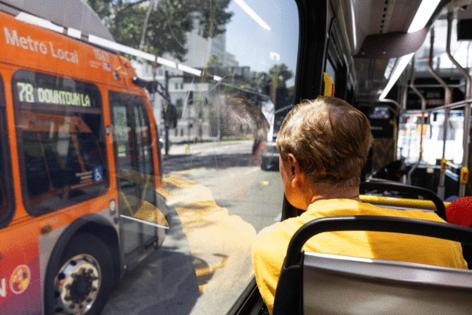Metro's ridership in June dropped to lowest of the year after immigration raids
Published in News & Features
LOS ANGELES — After months of a steady climb in ridership, Metro's numbers fell to its lowest levels of the year in June after the immigration raids throughout Los Angeles County.
The transit agency estimated a ridership count of roughly 23.7 million last month on its bus and rail systems — a 13.5% drop from May and the lowest June on record since 2022, when numbers had started to rebound since the pandemic emergency, according to Metro data. The large immigration sweeps began June 6.
The decline didn't affect the entire system. Ridership on the K Line, for example, rose 28% on weekdays, 85% on Saturdays and 72% on Sundays. Metro attributed the increase to the opening of the LAX/Metro Transit Center.
A variety of factors led to the drop elsewhere, including actions taken by Metro to close multiple stations during demonstrations after officials said that protesters breached the A line tracks, burned trash cans outside the Little Tokyo station, which was closed for up to 12 hours a day for nearly a week, and that they surrounded and vandalized Metro buses.
In El Monte, where officials said federal agents had been sighted questioning patrons at a Metro station, the busway was closed for several days.
The decisions to close stations were made in collaboration with local law enforcement, the Los Angeles Police Department and the county's Sheriff's Department, Robert Gummer, deputy chief of security and law enforcement, said during a board meeting last month.
"During the period of the protests, Metro has been challenged by behaviors that put our customers and our employees at risk," Gummer said.
Outgoing Metro chair and L.A. County Supervisor Janice Hahn expressed concerns that closures left peaceful protesters stranded.
"I think the unintended consequences of shutting down those stations really harmed the people who were peacefully protesting and trying to get out of there," Hahn said last month. "There seemed to be a lot of confusion — a lot of people who did not understand what was happening — and a lot of people who didn't know how to get out."
Fears over whether immigration raids would occur on bus or rail lines also affected ridership, which is largely Latino. A 2023 Metro survey showed that more than 60% of Metro bus riders and roughly 50% of its rail riders are Latino.
Mayor Karen Bass said the federal response stirred anxiety about using public transit.
"What the administration has done — the provocative actions of the administration — has also led to widespread fear in our city and people being afraid to get on Metro, people being afraid that maybe raids would take place," Bass said. "We have to look at how we make sure that people in our city feel comfortable and safe."
Board member and county Supervisor Hilda Solis echoed the concerns.
"I just pray that our staff as well as our patrons — people who ride our system — are not harmed," Solis said last month. "They're afraid — they're fearful for their lives."
In a widely shared video in June, masked agents descended on a bus stop in Pasadena and detained several people. The stop, which is owned by the city, was on one of Metro's bus routes.
Three men who were detained at the bus stop are Pasadena residents and plaintiffs in an ACLU lawsuit filed against the Trump administration over unlawful stops and a lack of access to legal representation during the ongoing immigration enforcement. According to the lawsuit, the masked agents who detained the men did not identify themselves as immigration officers and did not show any warrants. In detention, the men were provided little food and water and were forced to sleep on the floor of the holding center, the suit alleges.
In response, a federal court recently issued two temporary restraining orders to the federal government. The Trump administration has since asked an appeals court to lift the restrictions.
Metro has touted its rise in ridership after a drop during the pandemic emergency, and again after a spate of violence on rail lines and buses that affected public trust. During Metro's annual State of the Agency address last week, Chief Executive Stephanie Wiggins said that ridership has increased by more than 53% over the last four years and that in a recent survey, customer satisfaction rose to 87%.
It was not immediately clear whether ridership has started to rebound since last month's drop.
"I know that recent events have caused fear, anxiety and heartache in communities we all serve and call home," Wiggins said, acknowledging the recent turmoil throughout the region. "Many of us have friends, neighbors and loved ones who have been impacted."
©2025 Los Angeles Times. Visit at latimes.com. Distributed by Tribune Content Agency, LLC.







Comments